Eber’s water towers 2022
The leading trade journal in Sweden, VA-tidskriften Cirkulation has since 1998 an article series under the heading Ebers vattentorn (Eber’s water towers), where Eber Ohlsson with text and photo presents interesting water towers in the world (except Scania and Sweden). Below is a free translation to English of these texts.
Eber’s water towers in Cirkulation 1/2022
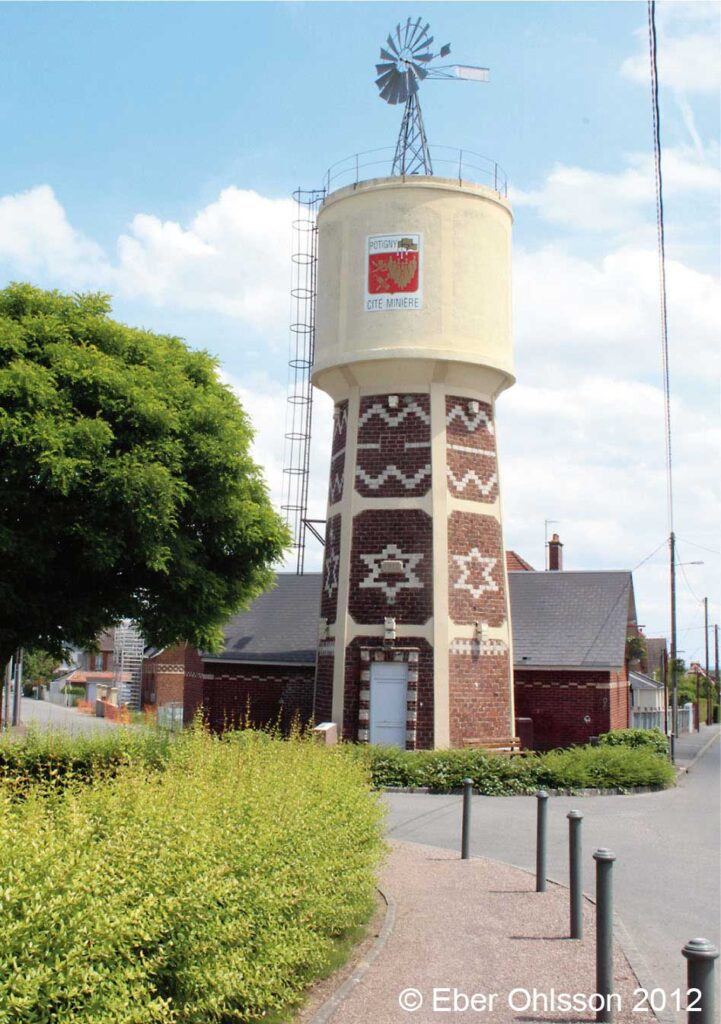
A free translation to English:
For the miners’ families to be able to wash their work clothes, a laundry room was built next to the new water tower in the small town of Potigny in French Normandy. The miners worked in the adjacent 1907 opened iron ore mine of Soumont-Saint-Quentin.
It was a 20 meter deep well that delivered the water to the community and the water tower. At the top of the tower, built in 1912, a windmill was installed for the water pumping. In 2004, after the mine was shut down in 1989, the municipality decided to restore towers and laundry facilities. These buildings are now beautifully illuminated in the evening.
Published 2022-02-09
Eber’s water towers in Cirkulation 2/2022
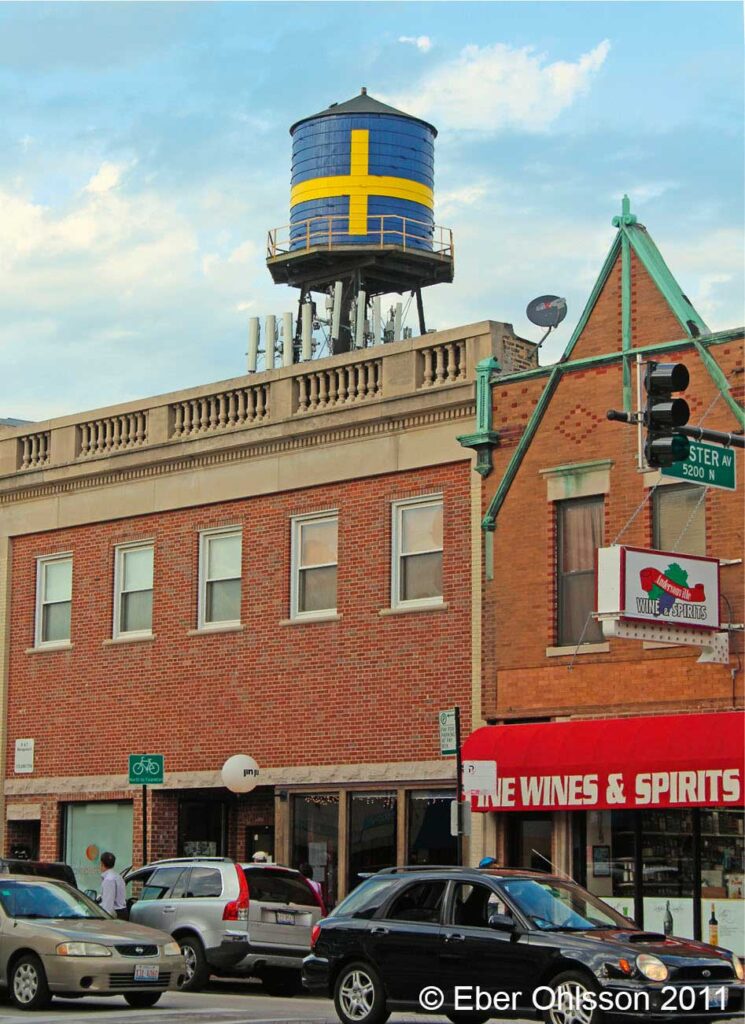
A free translation to English:
Chicago was said to be “Sweden’s second largest city” in 1900, because it was home to many immigrants from the old country. Especially in the Andersonville neighborhood in Chicago’s northern part lived many Swedish immigrants. This pattern that in the new country lives near their old compatriots is not uncommon today, irrespective of immigrant country. After one generation becomes this pattern although less accentuated.
On Andersonville commercial street N Clark Street can now be found both Swedish American Museum as one of the US so ordinary water towers on the roofs, painted with a yellow cross on a blue background.
Published 2022-03-16
Eber’s water towers in Cirkulation 3/2022
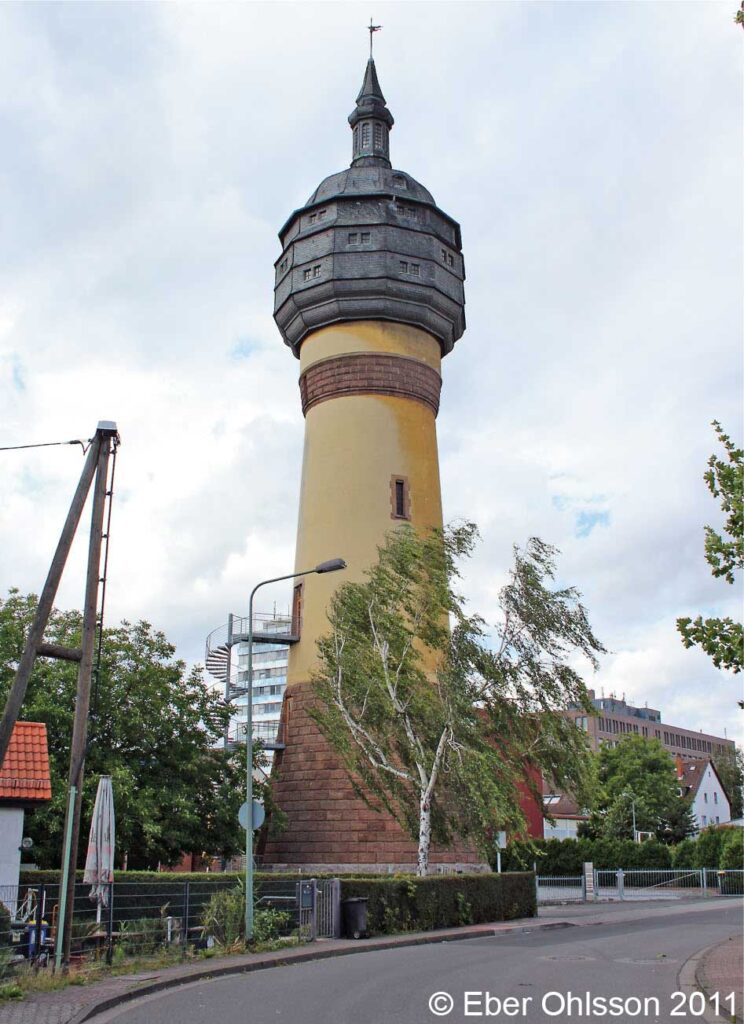
A free translation to English:
Rödelheim is today a district of German Frankfurt am Main, but was in 1899 when the water tower was built its own city. Civil engineer Max Hessemer designed and built the tower on his own account, but where the ground was made available to the city. Basalt bricks from a nearby quarry cover the 10 m high foot and slate covers the twelve-sided reservoir section.
The tower has a height of 51 meters and has two reservoirs totaling 380 m3. When Rödelheim was incorporated with Frankfurt in 1910 and connected to its pipe network, the tower was taken out of service. It has been on the list of protected buildings since 1972.
Published 2022-04-27
Eber’s water towers in Cirkulation 4/2022
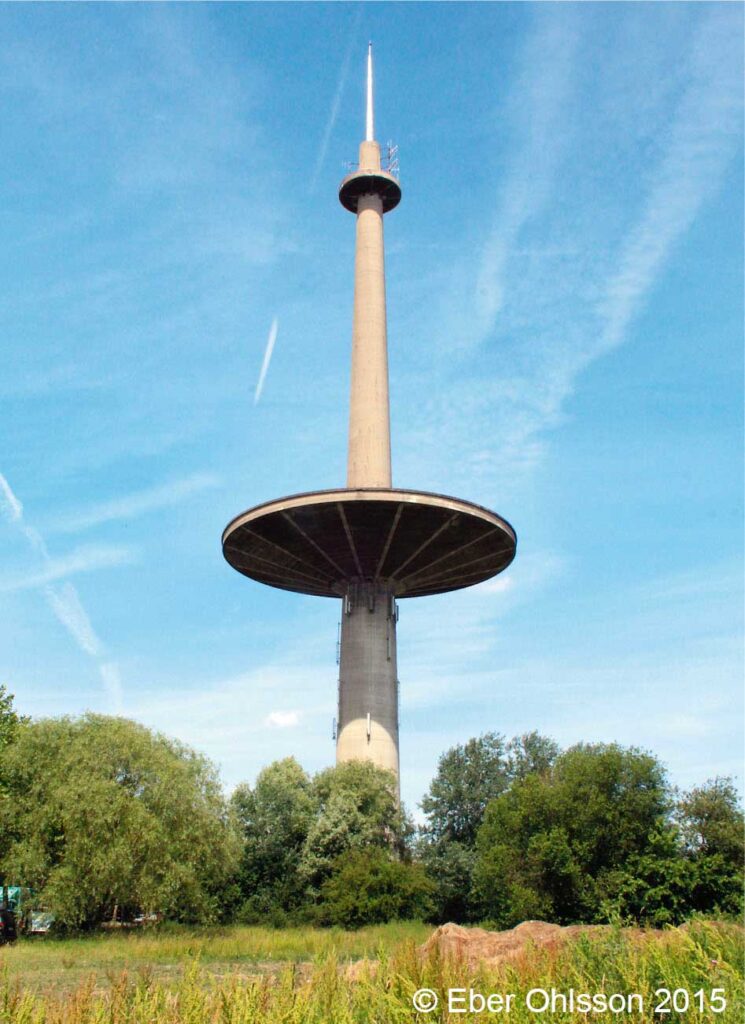
A free translation to English:
Today, the water tower is often retrofitted with masts for ether communication, not least for mobile traffic, which has devastating effects on the water tower’s appearance. A tower, however, initially planned for both functions is in the Flemish city of Mechelen, a town halfway between Antwerp and Brussels.
The construction consists of a 120 m high cone-shaped hollow shaft in reinforced concrete, at the base 9.2 m wide and higher up 3.4 m. At the top there is a 20 m high mast in stainless steel. The reservoir, built on the ground, has a diameter of 40 m and accommodates 2,500 m3. Professor Fernand Mortelmans has designed the tower.
Published 2022-06-08
Eber’s water towers in Cirkulation 5/2022
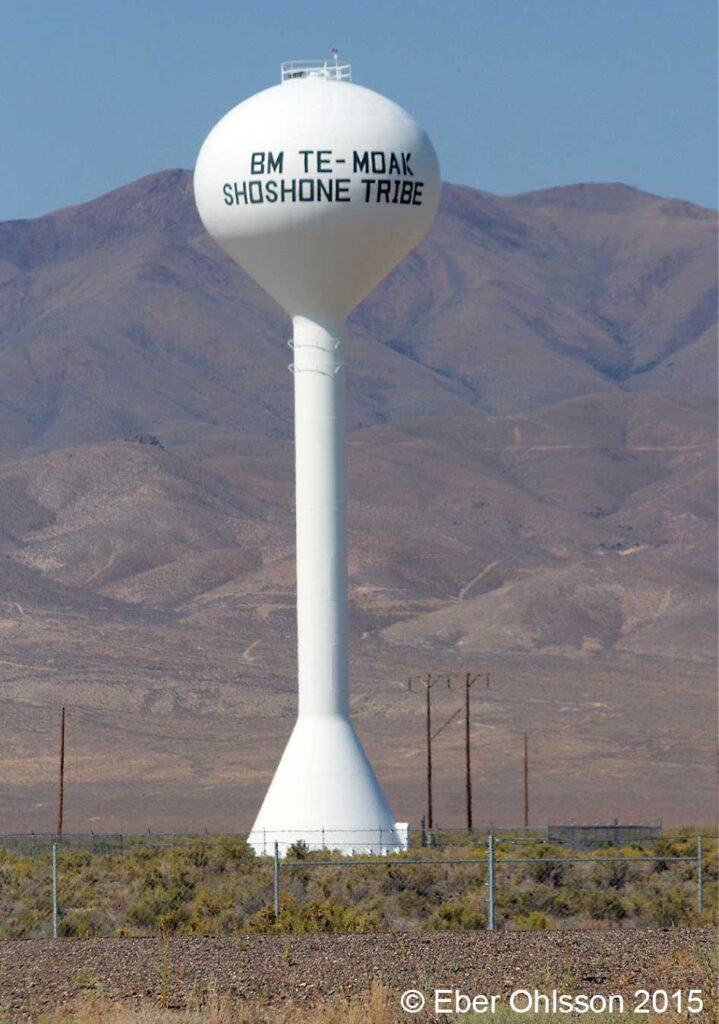
The indigenous people in what is today the United States, we called ‘Indians’. After the settlements of the Europeans, a large part of the indigenous population ended up in reserves. The image we have had for a long time of these reserves is that the population there has had poor living conditions.
During the latter part of the 20th century, this population has more forcefully asserted its rights and has also acquired new incomes. Evidence that more modern times have come is when you see a water tower near Battle Mountain in northeastern Nevada, which explains that here is the western Shoshons’ Te-Moak tribe.
Published 2022-08-31
Eber’s water towers in Cirkulation 6/2022
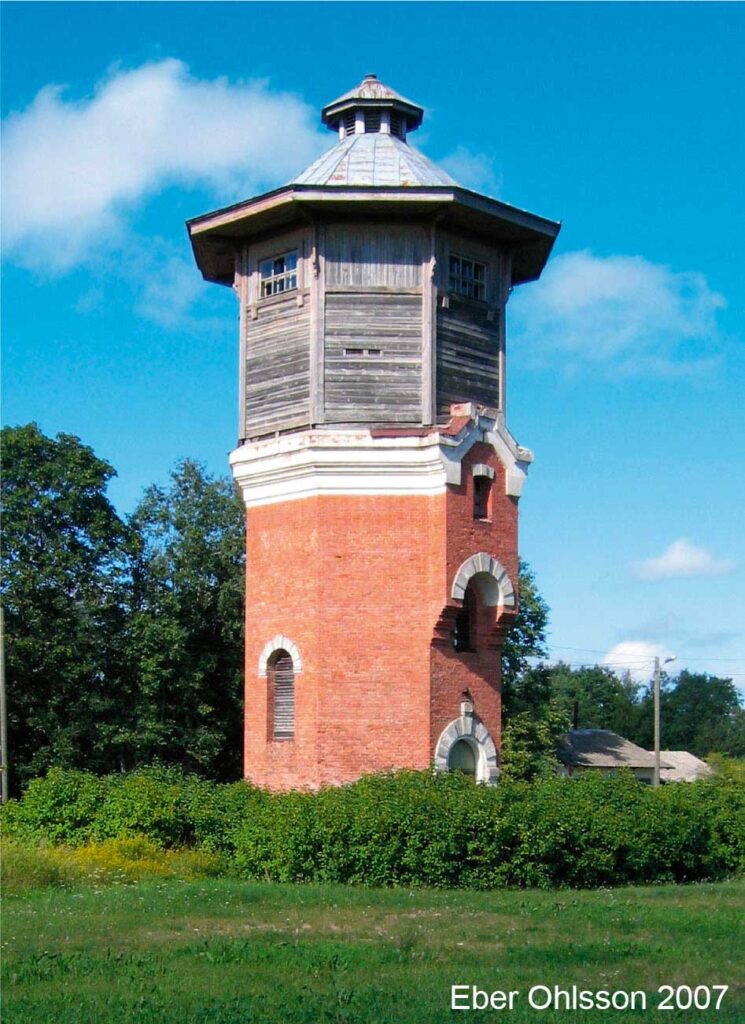
A free translation to English:
120 years ago, Hapsal (Haapsalu) was a spa town in Estonia for the Russian aristocracy and tsarist family. To get there quickly and conveniently from St. Petersburg, it was a train that mattered and therefore a railway was built from Tallinn to Hapsal. The steam locomotive required water and this meant that three similar water towers were built on this line, in Riisipere, Risti and Haapsalu.
The water tower in Risti, built in 1905, is 18 m high with a reservoir of 63 m3. It was later bought and restored by a water tower friend. The original equipment such as a cast iron staircase and an oven for heating the water remain.
Published 2022-01-05
Eber’s water towers in Cirkulation 7/2022
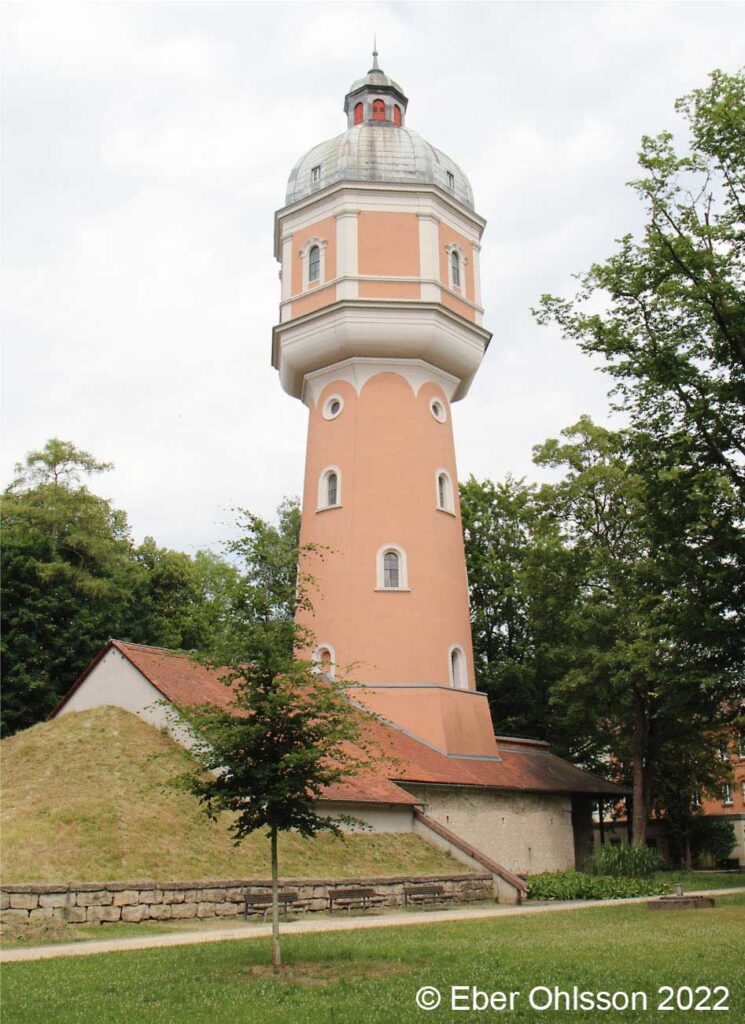
A free translation to English:
Building a water tower on top of an old gunpowder magazine may seem like a proposal with explosive force. However, this was carried out in the Bavarian town of Neu-Ulm, next to the more famous Württembergian town of Ulm across the Danube river.
The water tower was built in 1898/1900 in baroque style on an old fortification market and received a total height of 48 meters, of which the existing gunpowder was 6.6 meters. The height of the water mirror above the ground in the Intze construction was 33.5 meters and the reservoir received a volume of 350 m3. Of course, there is no gunpowder in the building, as is well known that the gunpowder shall be kept dry.
Published 2022-11-09
Eber’s water towers in Cirkulation 8/2022
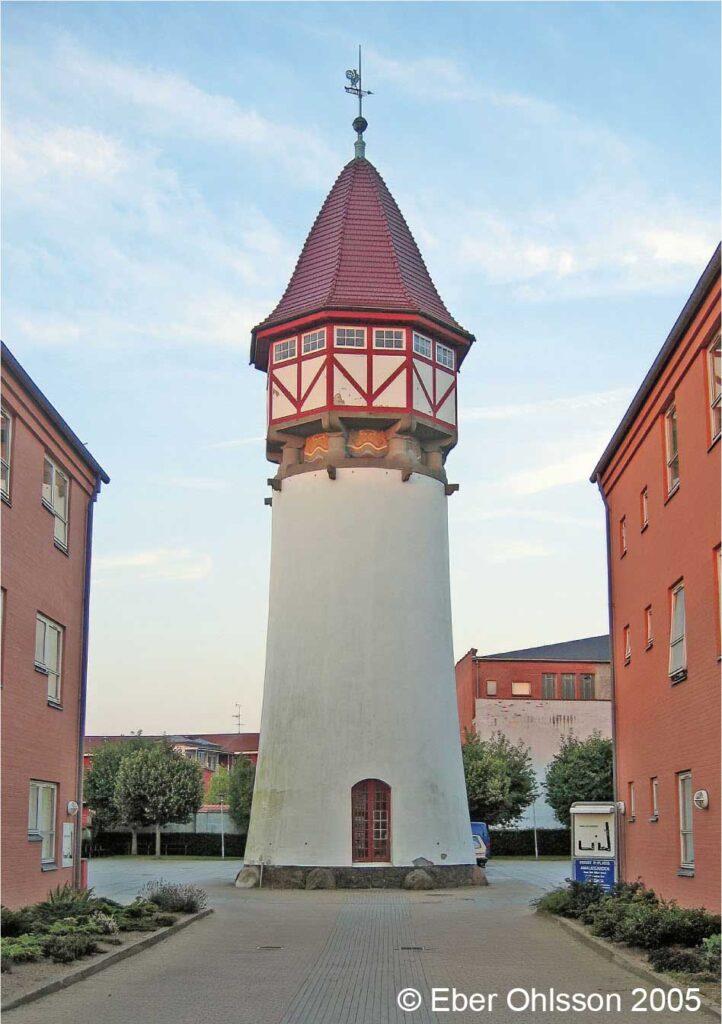
A free translation to English:
A humble water supply in the young Jylland town of Silkeborg meant that the insurance companies demanded high fire insurance premiums for the city’s textile industry. The successful textile factory C. Commichau & Co then judged that it would be more advantageous to both arrange their own water supply and build their own water tower.
In 1902 they therefore built, over a 40 m deep well, a 15.5 m high water tower in reinforced concrete with a reservoir of 23.5 m3 designed by architect Arnold Rosen in historic style. In the 1980s Silkeborg municipality restored the tower and in 1986 it became a building memory.
Published 2022-12-14
<<< Previous year (2021)
Following year (2023) >>>
